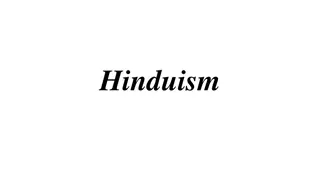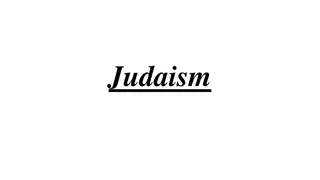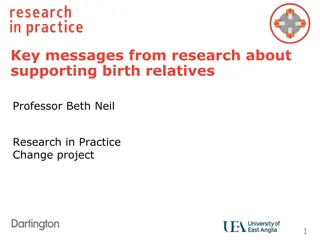Religion and Population Welfare: Views on Birth Control in Christianity, Judaism, and Hinduism
Religious views on birth control vary across Christianity, Judaism, and Hinduism. While Christianity's stance evolved over time, Judaism allows for certain exceptions, and Hinduism emphasizes ethical family planning practices based on ancient scriptures and teachings.
Download Presentation

Please find below an Image/Link to download the presentation.
The content on the website is provided AS IS for your information and personal use only. It may not be sold, licensed, or shared on other websites without obtaining consent from the author.If you encounter any issues during the download, it is possible that the publisher has removed the file from their server.
You are allowed to download the files provided on this website for personal or commercial use, subject to the condition that they are used lawfully. All files are the property of their respective owners.
The content on the website is provided AS IS for your information and personal use only. It may not be sold, licensed, or shared on other websites without obtaining consent from the author.
E N D
Presentation Transcript
Religion and Population Welfare Religion and Population Welfare
Religious views on birth control vary widely, and even those religions that seem to be the most opposed to birth control have traditions that allow the use of contraceptives. Family planning is embraced by religions across the spectrum as a moral good, a responsible choice, and a basic human right. The world s religions recognize that family planning helps build strong families, protect the health of women and children, reduce child and spousal abuse, and prevent unintended pregnancies.
Christianity: Christianity: Christian notions about birth control stem from church teachings rather than scripture (since the Bible says little about contraception). So beliefs about birth control tend to be based on different Christian interpretations of marriage, sex, and family. Contraception was condemned by Christianity as a barrier to God s procreative purpose of marriage until the start of the 20th century. After that the Protestant theologians became more willing to accept that morality should come from the conscience of each person rather than from outside teachings. Many Christians began to consider sex as a gift from God and a positive force that could strengthen the institution of marriage if couples did not feel threatened by the possibility of having children they could not support. The majority of Protestant denominations, theologians, and churches allow contraception and may even promote family planning as an important moral good. As with all issues of Christian morality, it stresses that members use birth control as dictated by their consciences.
Judaism: Judaism: Birth control views vary among the Orthodox, Conservative, and Reform branches of Judaism. The Torah promotes prolific childbirth; Orthodox rabbis believe that being fruitful and multiplying is a male duty. But many rabbis allow birth control in cases where pregnancy would seriously harm the woman. Jewish law considers children a blessing. So a man may not abstain from procreation or get sterilized until he has fathered a child. Conservative and Reform Jews feel that the benefits of birth control (female health, family stability, or disease prevention) uphold the commandment to "choose life" more strongly than if they violate the commandment to "be fruitful and multiply."
Hinduism: Hinduism: Traditional Hindu texts praise large families (which was normal in ancient times). Yet, Hindu scriptures that applaud small families also exist which emphasize the development of a positive social conscience. So family planning is seen as an ethical good. Contraception views vary widely among Hindu scholars. Although Gandhi advocated abstinence as a form of birth control, Radhakrishnan (a key Indian philosopher) and Tagore (the most prolific writer in modern Indian literature) encouraged the use of artificial contraceptive methods. Arguments in favor of birth control are drawn from the moral teachings of Hinduism. The Dharma (doctrine of the religious and moral codes of Hindus) emphasizes the need to act for the sake of the good of the world. Some Hindus, therefore, believe that producing more children than one or the environment can support goes against this Hindu code. In 1971, abortion was legalized in India and it was the first nation to establish a governmental population strategy based on birth control measures.
Sikhism: Sikhism: Many Sikhs use contraception; yet, to some, birth control is associated with lust and seen as disruptive to the natural cycle of procreation. There is also no religious mandate on abortion. Some don't support it because they believe the fetus has a soul. But this decision is considered a personal choice.
Buddhism: Buddhism: In Buddhism, there is no established doctrine about contraception. Traditional Buddhist teaching favors fertility over birth control, so some are reluctant to tamper with the natural development of life. A Buddhist may accept all contraceptive methods but with different degrees of hesitation. The worst of all is abortion or killing a human to be. In Buddhism, wholesomeness is the main criterion for moral judgment. A notion related to this is the Buddhism beliefs about the duty of the parent. Buddhism preaches the importance of humans to take care of their children, so they can grow up with a good quality of life. Buddhist teachings, therefore, support appropriate family planning when people feel that it would be too much of a burden on themselves or their environment to have more children.
Islam: Widespread variation on contraception attitudes can be found in the Islamic faith. Because contraception is not expressly prohibited in the Qur an, many Muslim scholars approve of family planning. Yet, some also believe that birth control is forbidden as the Qur an contains the command to procreate and abound in number. These scholars argue that only God can decide the number of children that a couple will have. However, Early Sunni Muslim literature discusses various contraceptive methods, and reveals that the practice of azl (withdrawal) is morally acceptable since it was practiced by the prophet Muhammad (PBUH). Sunni doctrine in favor of contraception suggests that that any contraceptive that does not produce sterility is morally the same as azl and is therefore accepted.
Cont Most Islamic traditions will permit the use of birth control where maternal health is an issue or where the well-being of the family may be compromised. The Islamic faith prioritizes human life, so being able to space out births allows a mother ample time to care for each child. The Islamic faith allows a lot of latitude in interpretation, which is reflected by the various differences in family planning policies by distinct Muslim groups and countries.























